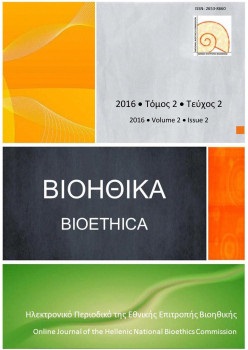Contraception and sterilisation of patients with severe psychiatric disorders
Abstract
The number of individuals that suffer from psychiatric diseases rises exponentially as a result of the humanitarian crisis and social exclusion. The increase in the incidence of psychiatric disorders has serious consequences in the ability/right to reproduce and to proper child rearing in order to assure the children' normal social and professional inclusion. So the big ethical dilemma is if we should or if we should not apply contraception or sterilisation upon individuals that carry severe psychiatric disorders. Contraception is a mild method of birth control in comparison to sterilisation with exception to abortion (termination of gestation) and to the 24 hours pill action (prevention of possible gestation). Thus, sterilisation can be a rough method of preventing conception but it is not a murder. Under the principle of the informed consent the doctor must be certain that the patient is aware of the disadvantages and the advantages of contraception's different methods, whereas as sterilisation procedure concerns the doctor must be certain that the patient is aware that sterilisation is not a reversible method.
People with severe psychiatric disorders usually are not able to understand or consent to therapeutic and reproduction matters because they lose their senses or have illusions and/or they cannot support themselves. When the patient does not have the ability to consent, the consent is given by the litigation guardian or from his/her relatives, whereas in the case of emergency the doctor can proceed to a medical action without patient's relatives proxy consent. Patient's advance directives should be taken in consideration by the doctor and should be announced to the patient's relatives even if the relatives disagree with them. The patient's principle of autonomy can come to a collision with the doctor's principle of benefit. The decision that should be made then should have as a moral compass the quality of patient's life and by extension the children's major interests. The frequent observed neglect and child abuse from parents that suffer from severe psychiatric disorders suggests that such parents will miss their children after State's competent bodies intervention and court decisions. Therefore we have to find ways to defend children' right for normal growth and development and the same time to protect people that suffer from severe psychiatric disease from the paternity and/or maternity burden. Furthermore, the infringement of autonomy, freedom or parity of patients should be avoided as well as the discrimination between healthy and sick individuals and the setting of a negative precedent for other types of intervention especially on people who are not capable to defend their rights.
All the above can be achieved using the tool of precise and sincere information, by creating capacity building measures for prevention and therapy through the application of targeted programs, for family planning centers build-up and funds raise, for continuing education of the parties concerned. Furthermore it would be of great help the setting up of independent Bioethics' Committees that will supervise and will contribute in monitoring and making decisions in order to access a reliable and fair health service on psychiatry and reproduction fields. Although in our days the individual rights make a particularly big issue, the obligations and the social competence are neglected. Therefore the legislators should take in consideration the rights of patients with severe psychiatric disorders as well the interests of the children that will be born.
Article Details
- Come citare
-
Μουμτζή (Sofia Moumtzi) Σ. (2016). Contraception and sterilisation of patients with severe psychiatric disorders. Bioethica, 2(2), 51–67. https://doi.org/10.12681/bioeth.19781
- Fascicolo
- V. 2 N. 2 (2016): Bioethica
- Sezione
- Original Articles
Authors who publish with this journal agree to the following terms:
- Authors retain copyright and grant the journal right of first publication with the work simultaneously licensed under a Creative Commons Attribution CC BY 4.0 License, which allows for immediate free access to the work and permits any user to read, download, copy, distribute, print, search, or link to the full texts of articles, crawl them for indexing, pass them as data to software, or use them for any other lawful purpose. Appropriate credit must be given by citing the author(s) and the original publication in this journal.
- Authors are able to enter into separate, additional contractual arrangements for the non-exclusive distribution of the journal's published version of the work (e.g. post it to an institutional repository or publish it in a book), with an acknowledgement of its initial publication in this journal.
We encourage authors to deposit their articles, as well as data underlying the publications, in institutional and/or other appropriate subject repositories.
Bioethica permits and encourages authors to archive the final publication pdf in institutional (e.g. the repository of the National Hellenic Research Foundation) or other appropriate subject repositories (e.g. SSOAR repository for social sciences), in compliance with institutional and/or funder open access policies, after publication in the BIOETHICA. Authors must provide bibliographic details that credit publication in the journal, as well as related funding details (when applicable).
Lists of institutional and other subject-based academic open access repositories can be found listed by country at the registry http://opendoar.org/countrylist.php
If your institution does not possess a repository you may deposit a copy of your paper at no cost with www.zenodo.org , the repository supported for open access research in the EU by the European Commission, through the project OpenAIRE (www.openaire.eu )



